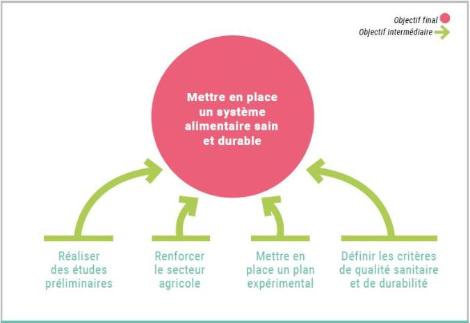Healthy and sustainable nutrition in day care centres
A project of the City Council of Pamplona-Iruña
January 2019
Fondation Daniel et Nina Carasso (FDNC)
Towards a Europe of territorial food systems ?
This study is extracted from the analysis of twenty-two French and Spanish projects related to new food models, all highlighting different challenges.
In Spain, governance is being built, while French food systems are looking for solutions to change scale. But in both countries, accessibility remains the weak link.
Example of the municipal project of the city of Pamplona for a change of food model in crèches.
Pamplona, Spain
Although the municipality of Pamplona has orchards, most of the agricultural land is located in the rest of the cantonal territory, 41% of which is devoted to crops. Of this land, 92% is used for rain-fed agriculture and more than three-quarters of the territory is reserved for cereals.
Pamplona City Council’s project involves supplying local products to the canteens of the municipal crèches. It is part of the strategy for sustainable food adopted after the signing of the Milan Urban Food Policy Pact in 2016. Its objective is to enable a change in the food model, in particular by acting on public procurement. An autonomous body is responsible for the management of eleven crèches, with a total of 1,134 places. 1,106 meals are served every day in all of these establishments. Ten of these schools have kitchen and dining facilities and their own staff. The setting is ideal for promoting a model of global change that takes into account pedagogical, nutritional, productive and sustainability dimensions. The project partners are the municipal crèches of Pamplona, which bring together eleven establishments, and the Navarra Institute of Agrifood Technology and Infrastructure (INTIA), which supports companies in the sector, the Council of Agroecological Production of Navarre (Nafarroako Nekazaritzako Produkzio Ekologikoaren Kontseilua, CPAEN-NNPEK), which certifies, promotes and boosts ecological production in Navarre, and the association Menjadors Ecològics, which defends agroecological production and the supply of organic and local products. From cooks to students, parents and teachers, everyone is made aware of the actions carried out. The role of families and suppliers is essential.

The Pamplona food system project relies on public collective catering to drive global change. On the basis of preliminary studies, an experimental plan is drawn up in two crèches: food categories, logistics and costs are examined. This inventory also makes it possible to increase the knowledge of the actors involved and, if necessary, to detect needs for ion format. The criteria for choosing foods are based on the fact that they are sustainable, fresh, local, seasonal and purchased directly from the producer. Once the productive potential of the area is known and the nutritional needs determined, menus can be drawn up with an emphasis on healthy and seasonality.
Soliciting specialised players
The project of the city of Pamplona requires specific knowledge in different subjects. It is difficult for a single institution to meet these requirements. This is why INTIA, the Navarra Institute of Agri-food Technology and Infrastructure, has been asked to draw up an inventory of organic production in the region. The Council of Agroecological Production of Navarre (CPAEN) facilitated dialogue with producers, which made it possible to analyse production potential and identify its limits. These exchanges stimulated participation. Thanks to this movement, balanced menus adapted to the specific characteristics of the territory have been prepared in the canteens of the municipal crèches, in partnership with an association, Menjadors Ecològics.